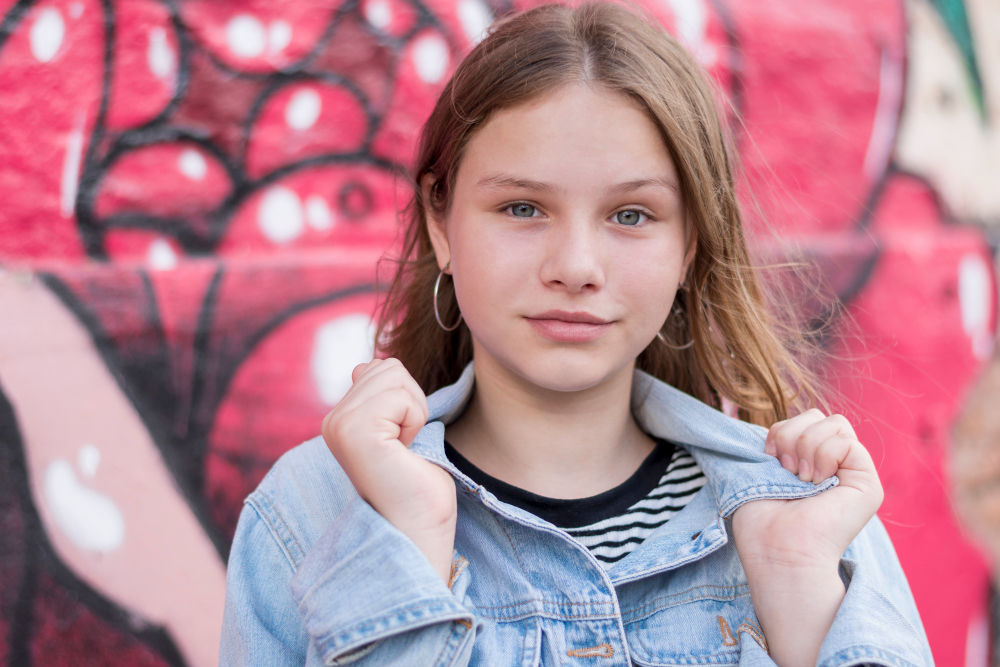I felt so hopeless in that meeting.
Underneath all the patronising words and well-meaning smiles, I could feel the same machinery at work—the one that asks disabled children to be gracious in the face of dismissal, polite in the face of erasure, composed in the face of harm.
“We’d ask if Jeannie could show a little grace.”
I felt my throat close and vomit threaten. Because when systems fail children like mine, they almost always ask those children to be the ones who absorb it gently.
But Jeannie didn’t flinch.
She said,
“I’m not going to be rude to them, but I’m not going in with open arms. I don’t know them, and I’m scared of them breaking my trust.”
I was speechless. Slay girl!
There was a time when I couldn’t have said those things myself.
When I was a child, I was hyper-conscientious. I wore responsibility like armour. After my parents divorced I inferred “good” meant being absorbent. I became the calm one, the caretaker, the translator of adult emotion. My family nicknamed me Granny. I never let anyone drive without a seatbelt. I knew every emergency exit. I avoided confrontation like it was lethal—but I could be bold when protecting others, because that didn’t require admitting what I needed. I was the knife, cutting myself down, making myself small and proper.
What I couldn’t do was say: you hurt me. What I couldn’t say was: please stop touching me.
I stayed silent to stay safe.
The thing I craved most in the world was people who would treat me the way I needed without me having to ask—because asking felt more dangerous than enduring harm.
That silence followed me for years. It took me decades to unlearn. But somehow, Jeannie—only in seventh grade—already knows that asking for what she needs isn’t shameful. That expressing overwhelm isn’t weakness. That trust is something to be earned, not assumed.
She’s already doing what I had to fight to become. She shouldn’t have to. But she is. And I’m so proud it makes my chest ache.
Another mom wrote to me after that meeting and saids something like:
“Sometimes the people who did the most harm were convinced they were helping. They believed they were doing their best—but they never understood the impact of their actions.
What we need now are more neurodivergent voices, so that those in power can finally stop trying in ways that keep missing the point.
And above all, our kids need to hear—again and again—that they were never the problem. It was the system that failed.”
I sobbed when I read that. Because I still need permission to believe it.
-
Advocacy toolkit: resources for families navigating school harm
Some of us arrived at advocacy slowly—one red flag at a time. Some of us were pushed into it suddenly, when everything fell apart. Some of us have been writing emails in our heads for years. Some of us are just now finding…
-
If I could: A letter to my daughter before another school meeting
If I could catch you before you fall, I would. If I could make them understand—make them see you as you truly are—I would. You are doing so well, in so many ways. If I could make you feel the pride you deserve,…
The school frames everything as opportunity. As generosity. They offer placement plans, transition strategies, youth workers. They use gentle language. But the truth is that Jeannie has had to endure such utter bullshit already—unsupported months, fading relationships, inconsistent accommodations, and the pressure to act “grateful” for every scrap of access.
Though she has been taught that joy is disruptive and autistic expression is something to be hidden or fixed, she still shows up—with her own clarity, with a soft heart wrapped in armour—and asks for Minecraft, art, and quiet conversation. She names her fears, states her limits, and holds her boundaries. She embodies grace without needing to change a bit, even if she won’t trust a new support worker straight away. She doesn’t need to change, she needs to be embraced, so she can grow and learn.
I want a world where Jeannie doesn’t have to be brave—where the system doesn’t demand her silence, her softness, or her performance, where “grace” doesn’t mean be less autistic and “support” doesn’t mean endure more pain.
Until that world exists, I will keep showing up and telling her, again and again to say:
“It was never your fault.
It was always the school that failed you.
And you—exactly as you are—are the one who is right.”









